Onions: Health benefits, health risks & nutrition facts
Here’s just how good onions can be for your health
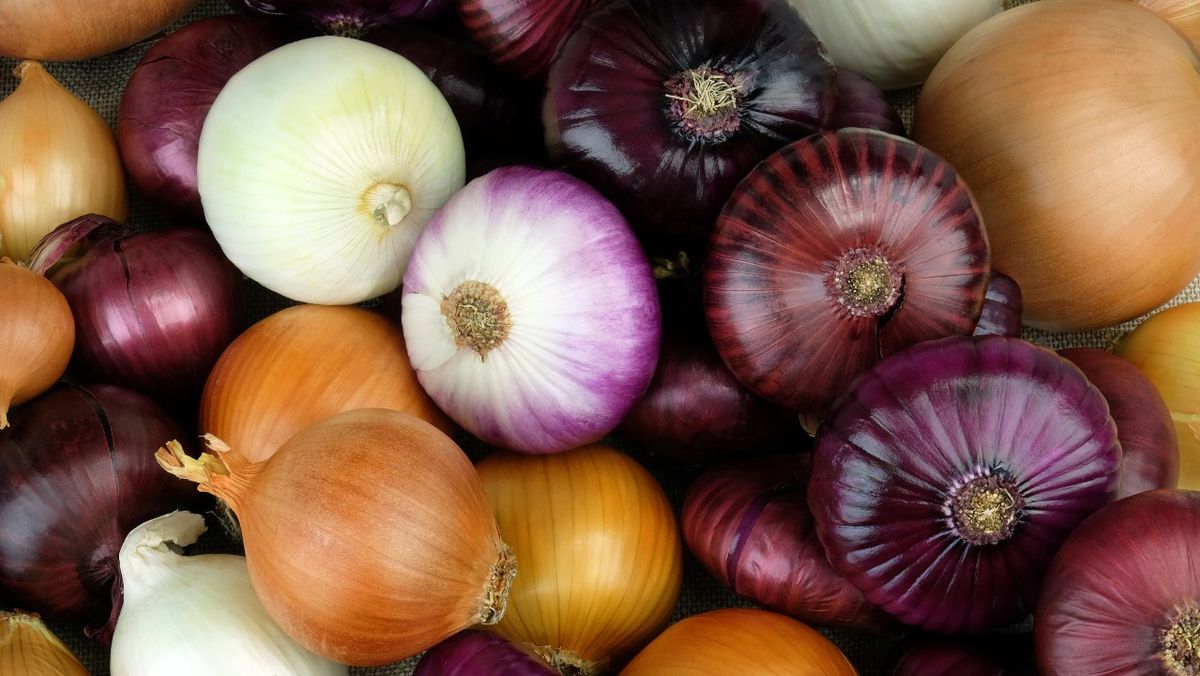
Turns out that onions are nothing to cry over — these flavorful bulbs are packed with nutrients.
"Onions are super-healthy," said Victoria Jarzabkowski, a nutritionist with the Fitness Institute of Texas at the University of Texas at Austin. "They are excellent sources of vitamin C, sulphuric compounds, flavonoids and phytochemicals."
Phytochemicals, or phytonutrients, are naturally occurring compounds in fruits and vegetables that are able to react with the human body to trigger healthy reactions. Flavonoids are responsible for pigments in many fruits and vegetables. Studies have shown that they may help reduce the risk of Parkinson's disease, cardiovascular disease and stroke.
A particularly valuable flavonoid in onions is quercetin, which acts as an antioxidant that may be linked to preventing cancer. “It also might have heart health benefits, though more studies need to be done,” said Angela Lemond, a Plano, Texas-based registered dietitian nutritionist and spokesperson for the Academy of Nutrition and Dietetics.
Quercetin has a host of other benefits, as well, according to the University of Maryland Medical Center, reducing the symptoms of bladder infections, promoting prostate health and lowering blood pressure.
Other important phytochemicals in onions are disulfides, trisulfides, cepaene and vinyldithiins. They all are helpful in maintaining good health and have anticancer and antimicrobial properties, according to the National Onion Association.
Here are the nutrition facts for raw onions, according to the U.S. Food and Drug Administration, which regulates food labeling through the National Labeling and Education Act.
Serving size: 1 medium onion (5.3 oz / 148 g)
Calories: 45 (Calories from Fat: 0)
Amount per serving (%DV*) *Percent Daily Values (%DV) are based on a 2,000-calorie diet.
Total fat: 0g (0%), Total Carbohydrate: 11g (4%), Dietary Fiber: 3g (12%), Sugars: 9g, Cholesterol: 0mg (0%), Sodium: 5mg (0%), Potassium: 190mg (5%), Protein: 1g, Vitamin A: (0%), Vitamin C: (20%), Calcium: (4%), Iron: (4%)
Partly because of their use in cooking around the world, onions are among the most significant sources of antioxidants in the human diet, according to the journal Phytotherapy Research. Their high levels of antioxidants give onions their distinctive sweetness and aroma.
"Foods that are high in antioxidants and amino acids allow your body to function optimally," said Lemond. "Antioxidants help prevent damage, and cancer. Amino acids are the basic building block for protein, and protein is used in virtually every vital function in the body."
Sulfides in onions contain necessary amino acids. “Sulfur is one of the most common minerals in our body that assists with protein synthesis and building of cell structures,” said Lemond.
"I like to recommend eating onions because they add flavor without salt and sugar," Jarzabkowski said. Onions are low in calories (45 per serving), very low in sodium, and contain no fat or cholesterol. Furthermore, onions contain fiber and folic acid, a B vitamin that helps the body make healthy new cells.
Onions are healthy whether they're raw or cooked, though raw onions have higher levels of organic sulfur compounds that provide many benefits, according to the BBC. Research published in the Journal of Agricultural and Food Chemistry found that there is a high concentration of flavonoids in the outer layers of onion flesh, so you'll want to be careful to remove as little of the edible part of the onion as possible when peeling it.
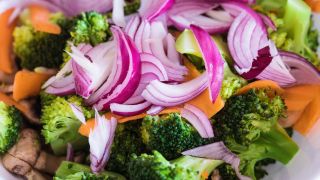
Health benefits
Heart health
According to Jarzabkowski, onions encourage a healthy heart in many ways, including "lowering blood pressure and lowering heart attack risk." Sulfur acts as a natural blood thinner and prevents blood platelets from aggregating, according to the journal Thrombosis Research. When platelets cluster, the risk for heart attack or stroke increases. This research further supports a similar 1992 study in Thrombosis Research that focused on sulfurs in garlic. Furthermore, a 1987 animal study in the Journal of Hypertension demonstrated delayed or reduced onset of hypertension with sulfur intake. However, the authors said more research was needed to determine if this benefit might be found in humans.
Recently, health researchers have noticed a relationship between messaging molecules called oxylipins and high cholesterol management. Consuming onions increases oxylipins that help regulate blood fat levels and levels of cholesterol, according to the journal Redox Biology
The quercetin in onions may also help prevent plaque buildup in the arteries, caused by mounting cholesterol, which reduces the risk of heart attack and stroke, according to the University of Maryland Medical Center.
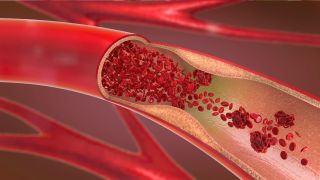
A study published in the journal Pharmacy & Pharmacology International Journal, examined the effects that onions have a hyperlipidemic (cholesterol-lowering) agent. Researchers followed participants that were advised to eat a 200g daily dose of onions, across breakfast, lunch and dinner for two months. The study found that in 35 of the 40 participants, total cholesterol was significantly reduced. “We concluded from this research work that Onion and Ginger reduces risk of CAD [coronary artery disease] by decreasing plasma total cholesterol and LDL [low-density lipoprotein] cholesterol,” the study authors wrote.
Anti-inflammatory
Onions’ sulfurs may be effective anti-inflammatory agents, according to a 1990 study in the journal International Archives of Allergy and Applied Immunology.Quercetin has been found to relax the airway muscles and may provide relief of asthma symptoms, according to a 2013 study in the American Journal of Physiology.
Immune system
"The polyphenols in onions act as antioxidants, protecting the body against free radicals," said Anne Mauney, a dietitian based in Washington, D.C. Eliminating free radicals can help encourage a strong immune system. Free radicals are “unstable molecules” that can interfere and damage the structure of cells in your body and even your DNA, according to the . The human body produces free radicals in response to pollution, ultraviolet light and as a part of our immune system own bodies produce to fight bacteria and viruses. However, antioxidants naturally neutralise them and keep them in check.
According to the University of Maryland Medical Center, the quercetin in onions also reduces allergic reactions by stopping your body from producing histamines, which are what make you sneeze, cry and itch if you're having an allergic reaction.
Cancer
Research published in the journal Molecular Nutrition & Food Research, found that intake of allium vegetables, including onions, were associated with reduced gastric cancer risk.
Quercetin may be a powerful anti-cancer agent, according to Jarzabkowski. The University of Maryland Medical Center said that quercetin may especially inhibit cancer cells in "breast, colon, prostate, ovarian, endometrial, and lung tumors."
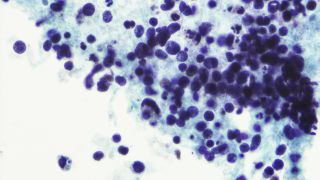
The National Onion Association discussed a recent study from the Netherlands that showed that people who ate onions absorbed twice as much quercetin as those who drank tea, and more than three times as much quercetin as those who ate apples, which are other high-quercetin sources. Red onions are especially high in quercetin, according to the association. Shallots and yellow onions are also good options. White onions contain the least amount of quercetin and other antioxidants.
The consumption of vegetables from the genus Allium – which includes onions – has been linked to reducing the risk of colorectal cancer, according to a study published in the Asia-Pacific Journal of Clinical Oncology. Researchers studied 833 participants and concluded that the odds of having colorectal cancer was 79% lower in people that ate higher quantities of allium vegetables than those with lower levels of consumption. "It is worth noting that in our research, there seems to be a trend: the greater the amount of allium vegetables, the better the protection," said senior author Dr. Zhi Li, of the First Hospital of China Medical University, in a statement. "In general, the present findings shed light on the primary prevention of colorectal cancer through lifestyle intervention, which deserves further in-depth explorations."
Onions may help with some side effects from cancer treatments, as well. Research published in Integrative Cancer Therapies found that consuming fresh yellow onion helped lessen insulin resistance and hyperglycemia in breast cancer patients undergoing a form of chemotherapy known to cause insulin resistance.
Digestion
The fiber in onions promotes good digestion and helps keep you regular. Additionally, onions contain a special type of soluble fiber called oligofructose, which promotes good bacteria growth in your intestines. A study published in the journal Clinical Gastroenterology and Hepatology found that oligofructose may help prevent and treat types of diarrhea. The phytochemicals in onions that scavenge free radicals may also reduce your risk of developing gastric ulcers, according to the National Onion Association.
Regulating blood sugar
The chromium in onions assists in regulating blood sugar. The sulfur in onions helps lower blood sugar by triggering increased insulin production. Research published in the journal Environmental Health Insights revealed that this might be especially helpful to people with people with diabetes. People with Type 1 and Type 2 diabetes who ate red onions showed lower glucose levels for up to four hours.
People with Type 2 diabetes saw more normalized liver enzymes and lower glycemic levels when consuming sliced onions, according to a study in the journal Nutrition.
Bone density
The daily consumption of onions can improve bone density in women who are going through or have finished menopause, according to a study published in the journal Menopause. Researchers discovered that women who ate onions frequently had a 20 percent lower risk of hip fracture than those who never ate onions.
Researchers have also found that onions can help to combat the effects of osteoporosis – a chronic inflammatory condition – which causes the loss of bone mineral density (BMD), according to the journal Food Frontiers.
Health risks
While not especially serious, eating onions can cause problems for some people. The carbohydrates in onions may cause gas and bloating.. Onions, especially if consumed raw, can worsen heartburn in people who suffer from chronic heartburn or gastric reflux disease, according to one 1990 study in the American Journal of Gastroenterology.
Eating a large amount of green onions or rapidly increasing your consumption of green onions may interfere with blood thinning drugs, according to the University of Iowa . Green onions contain a high amount of vitamin K, which can decrease blood thinner functioning.
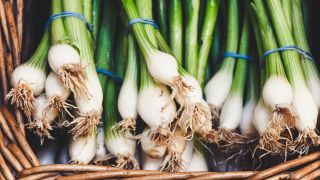
It is also possible to have a food intolerance or an allergy to onions, but cases are rare, according to an article in the Journal of Allergy and Clinical Immunology. People with onion allergies may experience red, itchy eyes and rashes if an onion comes into contact with the skin. People with an intolerance to onions may experience nausea, vomiting and other gastric discomfort.
Lastly, Jarzabkowski encouraged people to make sure their onions are fresh. "Onions keep for a long time," she said, "but they still spoil." Onions spoil much faster if they are chopped or sliced. If you cut up your onions for later use, be sure to refrigerate them in a closed container. Research published in the Journal Food Protection that unrefrigerated yellow onions showed potential growth of E.coli and salmonella, though refrigerated ones did not.
Onion history
According to the National Onion Association:
Onions probably originated in central Asia, in modern-day Iran and Pakistan. Prehistoric people probably ate wild onions long before farming was invented. Onions may have been among the earliest cultivated crops.
Onions also grew in Chinese gardens as early as 5,000 years ago, and they are referred to in the oldest Vedic writings from India. As early as the sixth century B.C., a medical treatise, the Charaka Sanhita, celebrates the onion as medicine, a diuretic, good for digestion, the heart, the eyes and the joints.
A Sumerian text dated to about 2500 B.C. tells of someone plowing over the governor's onion patch.
In Egypt, onions were planted as far back as 3500 B.C. They were considered to be objects of worship, and symbolized eternity because of the circle-within-a-circle structure. Paintings of onions appear on the inner walls of pyramids and other tombs.
Onions were buried with mummies. Some Egyptologists theorize that onions may have been used because it was believed that their strong scent and/or magical powers would prompt the dead to breathe again.
Onions are mentioned in the Bible. In Numbers 11:5, the children of Israel lament the meager desert diet enforced by the Exodus: "We remember the fish, which we did eat in Egypt freely, the cucumbers and the melons and the leeks and the onions and the garlic."
The Greeks used onions to fortify athletes for the Olympic games. Before competition, athletes would consume pounds of onions, drink onion juice and rub onions on their bodies.
The Romans ate onions regularly. Pedanius Dioscorides, a Roman physician of Greek origin in first century A.D., noted several medicinal uses of onions.
Pliny the Elder catalogued Roman beliefs that onions could cure poor vision, induce sleep, and heal mouth sores, dog bites, toothaches, dysentery and lumbago. Pliny wrote of Pompeii's onions and cabbages, and excavators of the doomed city found gardens where, just as Pliny had said, onions had grown. The bulbs had left behind cavities in the ground.
By the Middle Ages, the three main vegetables of European cuisine were beans, cabbage and onions. Onions were prescribed to alleviate headaches, snakebites and hair loss. They were also used as rent payments and wedding gifts.
The Pilgrims brought onions with them on the Mayflower. However, they found that Native Americans were already using wild onions in a variety of ways: eating them raw or cooked, as a seasoning or as a vegetable. Onions were also used in syrups, as poultices, as an ingredient in dyes, and even as toys.
Additional resources
For more information about the world of onions and other vegetables check out “Onions and Garlic: A Global History” by Martha Jay and “Understanding Nutrition: The Complex Solution to the Simple Problem” by Jason Houghton. Check out the British Nutrition Foundation or the U.S. Food & Drug Administration for more on vegetable nutritional information.
Bibliography
Gareth Griffiths, et al, “Onions--a global benefit to health”, Phytotherapy Research, Volume 7, November 2002.
Ly Tram Ngoc, et al, “Antioxidative compounds from the outer scales of onion”, Journal of Agricultural and Food Chemistry, Volume 21, October 2005
Chan KC, et al , ”Protective effect of three diallyl sulphides against glucose-induced erythrocyte and platelet oxidation, and ADP-induced platelet aggregation”, Thrombosis Research, Volume 5-6, December 2002.
R Horie, et al, “Effects of sulphur amino acids on the development of hypertension and atherosclerosis in stroke-prone spontaneously hypertensive rats”, Journal of Hypertension, Volume 5, December 1987.
Diana González-Peña, et al, “New insights into the effects of onion consumption on lipid mediators using a diet-induced model of hypercholesterolemia”, Redox Biology, Volume 11, April 2017.
Shah Murad, et al, “Ginger and onion: new and novel considerations”, Pharmacy & Pharmacology International Journal, Volume 1, 2018.
Sign up for the Live Science daily newsletter now
Get the world’s most fascinating discoveries delivered straight to your inbox.
Jessie Szalay is a contributing writer to FSR Magazine. Prior to writing for Live Science, she was an editor at Living Social. She holds an MFA in nonfiction writing from George Mason University and a bachelor's degree in sociology from Kenyon College.
- Scott DutfieldContributor













